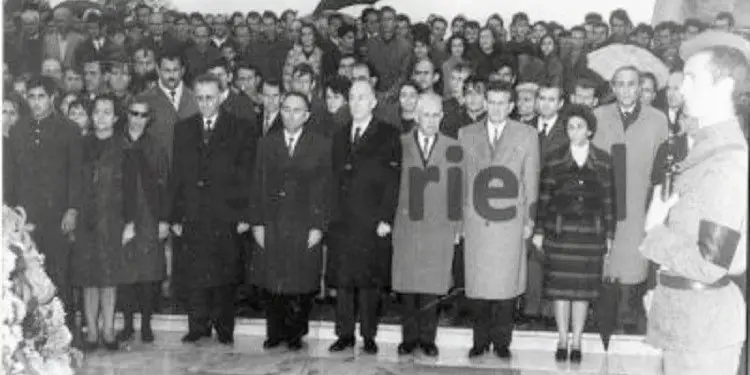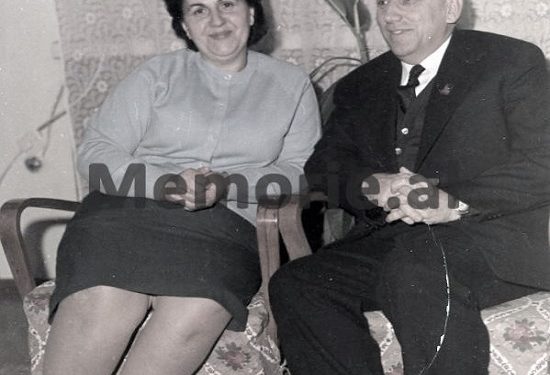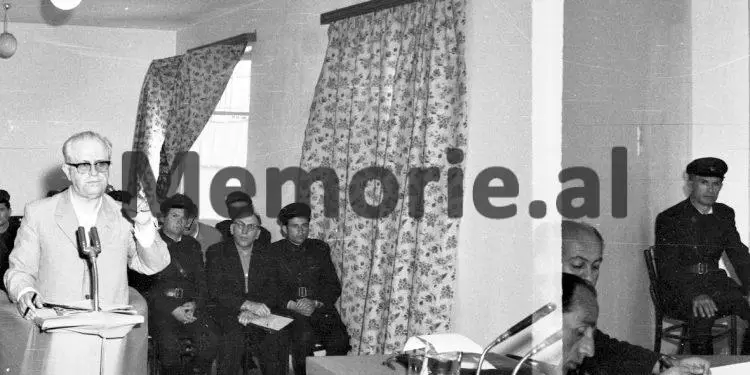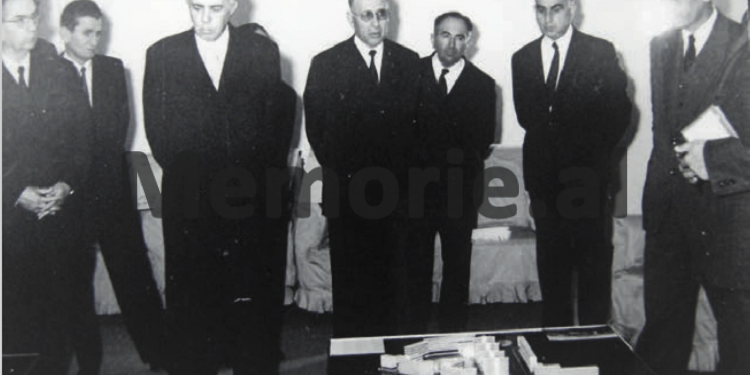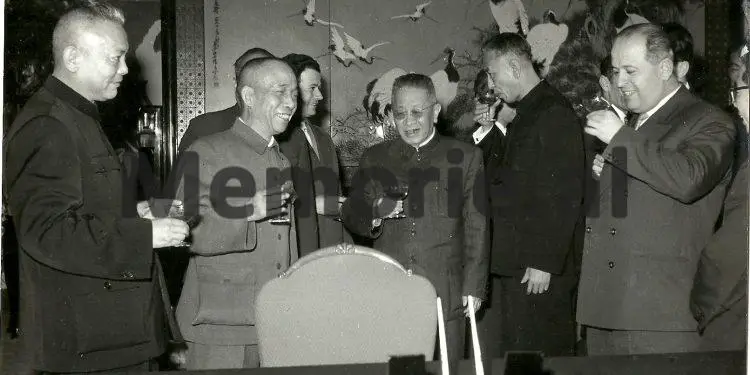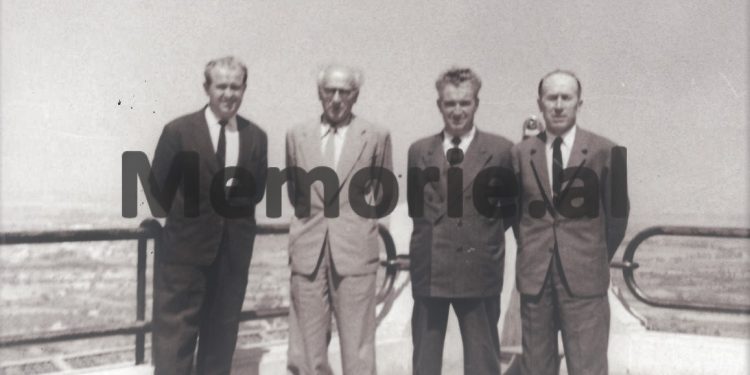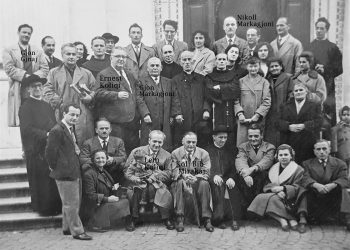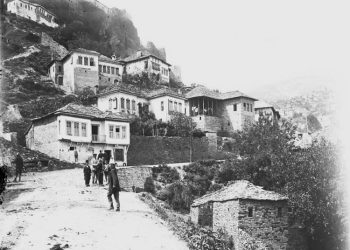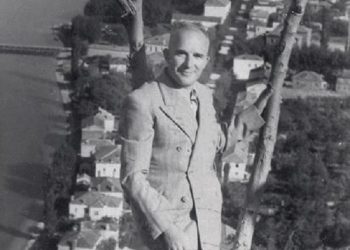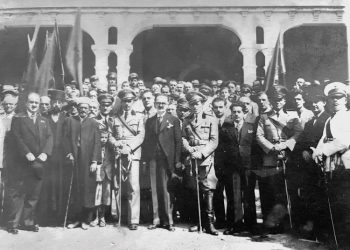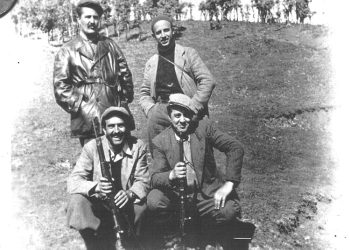Dashnor Kaloçi
The first part
Memorie.al publishes some archival documents extracted from the Central State Archive in Tirana (fund of the former Central Committee of the ALP), where is the discussion of Enver Hoxha held in the VII Plenum of the Central Committee of the ALP , where he analyzed and talked about the problems that had arisen in the oil sector, where he for the first time criticized and made serious accusations, not only against the leaders of that sector, starting with the General Director of Petroleum, Lipe Nashi , the first secretary of the Party Committee of the district of Fier, (where most of the oil industry was concentrated), Piro Gusho, engineers and specialists such as: Andrea Manço, Zenel Hamiti, Koço Plaku, Protoko Murati, Beqir Aliaj, Milto Gjikopulli, et al., But also to the Prime Minister Mehmet Shehu, members of the Politburo and ministers, such as Abdyl Këllezi, Koço Theodhosi, Kiço Ngjela, Vasil Kati, etc. The full speech of dictator Enver Hoxha and the unknown accusations he made against Abdyl Këllez, Koço Theodhos, Kiço Ngjela, Vasil Kat, Dashnor Mamaqi, Ramadan Xhangolli, etc., whom he called saboteurs who had done hostile work, comparing them with The “hostile activity” that Beqir Balluku had done with Petrit Dumen, Hito Çako, etc. Enver Hoxha’s proposals for their dismissal from all party and state positions and functions they had held until then and the election and appointment of “some new comrades” in their place in the Politburo and the Central Committee of the ALP , such as: Pali Miska, Hekuran Isai, Qirjako Mihali, etc., whose biographies, Enver made public in that plenum!
Closing speech at the 7th Plenum of the Central Committee of the ALP
May 29, 1975
Based on the work of this important Plenum of the Central Committee on Petroleum, given the discussions and decisions of the meetings of the Politburo on this issue, where I also spoke and you are aware, I would like to express my views not only on the issue of oil, but also on a number of other problems that the whole Party is discussing and resolving successfully. Studying the minutes of the meetings of the Presidency and the Council of Ministers, for the shortcomings and mistakes that have been proven in the state apparatus and in some sectors of the economy, where a lot of bureaucracy and technocracy have developed, which have led us to turn a blind eye to sabotage. serious, such as that of oil, I find that, along with Mehmet Shehu, who has his responsibility for this, by some ministers self-criticism is generally superficial and criticism among them timid and restrained.
To the above friends and to some others it seems to me that the fear comes from compromising guilt or error and in these cases from those who have committed serious mistakes and faults, such as Abdyl Këllezi and Koço Theodhosi, attempts are made to spread the guilt, saying: “I asked you”, “I informed you”, “we made the decision together”, etc. Of course, people who suffer from certain complexes do not properly resist these strategies. The self-criticism of some comrades of the Government is not deep enough politically and ideologically, the emphasis on them is more on the technical reporting of issues and hence attempts are made for some self-criticism, which does not come from the technical framework of the problem. They point out the danger of the abnormal development of a number of issues, but they move away from deepening the problems and do not see the political-ideological consequences of this development.
This is what Abdyl Këllezi does, for example, about what he says; he had to answer a series of questions at the Government meeting, he had to make serious self-criticism, not dodge, answering questions only sparingly. Friends, of course, say that their conscience kills them too. This is understandable, but not enough. An ideological analysis of these problems in themselves and of the distortions that have been proven in Abdyl Këllezi and Koço Theodhosi, I do not see done properly. This is of great importance to accomplish, otherwise distortions and deviations will be repeated, as they are being repeated. We have to come to the conclusion that there are friends, and this is worse, who are removed as if ideologically and politically they understand all things. But this is not the case in many cases. The work proves to us that we put the problems on the right track, but there are people who want and fight to divert them and who think that both the theory and the policy of the problem are clear once and for all, and for the organizational side, that has This is also of great importance, they say: “We are finished specialists” on this issue.
What I am saying confirms the successive events that we are analyzing. In 1966 we took political measures, explained “ideologically deeply” and organized the work “so well” that it was remembered that it was understood on the basis of what bureaucracy is and how to fight it. But the facts prove that by some nothing was understood and organized properly. After that operation, which was considered important, what happened to us? Something much heavier, much more dangerous. And why much more dangerous? Because this happened after the first operation that was said to understand the danger of bureaucracy, which was being curbed. However, in fact, this brake was made of straw and was finally removed altogether. Why? We are being told: “It slipped from our hands, we did not anticipate it, we got excited”, etc. Life proved that the danger of bureaucracy was not only not understood politically and ideologically, but some took organizational measures to blow up the apparatus, to make bureaucracy gangrene in the leading administrations of the economy, trade, the Planning Commission. The state, the culture, the army, etc., thus became gangrene for the state.
People who pretend to know these things, both theoretically and politically, do not in fact know well what the state of the proletariat is, what the democracy of the proletariat is, and what, on the other hand, is the state administration do not theoretically understand the importance of one and the other, the connections and dependencies between them, but these people come to the wrong theoretical conclusion to identify the administration with the state. According to them, you are mentioning the term administration, by this is meant the state of the proletarians and hence it is quite easy to move on to the practice of the administration ruling over the state and not the state over the administration. The state of the proletariat, the ‘dictatorship of the proletariat’, is not only the administration, but, first and foremost, the state power of the triumphant working class in the Socialist revolution led by the Party. This state exists to suppress the enemies of the working class. We have understood this, they say.
No, it is not entirely so, until the active and direct participation in the governance of the country, including the legislative and executive sphere in the whole range defined by the Party, is not properly understood and exercised by the working class and the broad masses of the people. , based on Leninism; if popular councils are underestimated and left formal; in case the apparatus does not bring people of the class and working masses, where to work at a revolutionary temp; in case everything is not controlled according to the norms of proletarian democracy. If we do not rely heavily on all Leninist theses on these capital problems, then we can embark on the opportunist-liberal path. It is not enough just to speak in Marxist terms and in practice allow bourgeois, liberal, revisionist views to develop. To say these thoughts openly, not to be burdened, to deepen these issues ideologically, why there are friends who do not understand them and do not try to understand them, therefore they say: “Our conscience kills us” and they are satisfied with so.
The issue of the state is a capital problem for the Party and is of great importance to the working class. A correct understanding of the role and functions of the socialist state is a first-rate theoretical issue. You have to understand it well in theory, so that you can act correctly in practice as well. The theoretical distortions of state power lead to a number of deadlocks that Marx, Engels and Lenin have strongly emphasized, unmasking to the end the anti-Marxist currents for the state. For us communists and for the working class, the Marxist-Leninist theory of the state must be well ingrained in our heads. Beware of micro-bourgeois, anarchist, liberal, etc. distortions for our basic theory. There are people who are often removed as if they know the issue properly, but practice has often proven gaps in its meaning.
We know that the state, in general, is an organ of class rule, it, as Engels says, “… is the product of society” to a certain degree in our working class, in alliance with the peasantry, won by war and by Violence seized power, snatched it from the landlords of the bourgeoisie and, on the ruins of the old feudal-bourgeois-fascist state, created its own state, the dictatorship of the proletariat, which is a state, a special force for the oppression of the exploiting classes by its classes exploited. This dictatorship of the proletariat also creates the apparatus of state power. The state, then, as our classics teach us, is the organization of the violence for the extinction of the user classes. The state means the proletariat organized in the ruling class. We have applied this great idea of Marx in life and we must understand it deeply. To understand well that the working class also organizes the means to exercise violence against its enemies and in the interest of the workers, which means in the interest of all the people?
As long as the state exists, it must be clearly understood that class antagonisms are incompatible, and from this it is necessary to properly understand the revolutionary role of the proletariat, which is organized into a ruling class, that is, the state. I am insisting on these Marxist-Leninist principles for the role of the proletariat and its dictatorship, because in practice we are escaping distortions in the meaning and implementation of its prerogatives. If we take the theoretical and practical meaning of the functionaries of the state apparatus, we will find that there are functionaries, as members of the organs of society, who are sometimes placed above the society, above the class; they forget that society and the class are above them. It has been found to be fair, both theoretically and practically, for high-ranking state officials and apparatuses to receive high salaries. But why? Our great teachers, Marx and, later, Lenin, have pointed out that the differences in wages should be small. This valuable lesson on wages has been considered by opportunists as a requirement of primitive democracy.
These lessons were completely forgotten in the Soviet Union, especially after World War II. Even in Albania, there is a wrong spirit and mentality, according to which: “state officials should be only those with high school, they should lead and have the highest salaries.” This is contrary to what Lenin says. We have given education, even secondary, to a large majority of workers who can quite well manage any state work with a normal wage of the worker, therefore to eradicate the mentality of the caste of privileged people, among whom arrogance is cultivated and arrogance, the tendency for the apparatus to be placed above the state and thus to trample on Marxist-Leninist principles and Party norms. We speak against bureaucracy, but it is these people who feed this evil; we speak against putting personal interest above the general interest, but with large wage differences, we promote this personal interest; we speak against arrogance and arrogance, but the hierarchy in state administrations (not in organizational functions and duties, but in high salaries and in the micro-bourgeois sense of the place held in the administration), creates these; we speak of the arrogance of the people, but we must know that this is also nurtured by the bourgeois thought of the supremacy in society and in power of the “learned men.”
All these and other views stand out in many of our civil servants who fight for positions in the state, for high salaries, who struggle to climb and get angry when they sit in charge, who have a lot of voices for transfer, turnover and work at the base they regard it as an insult, as an injustice, as if labor and great production are not in factories or fields, but in ministries or offices. All these unjust philosophical worldviews, of course, must be corrected with a sound political and ideological education, but this education, if not accompanied by practical measures, has no value. The theory must be applied in life. All these inflated state apparatuses and agricultural cooperatives, with these mentalities and worldviews that they create in the people, cost very politically and economically our society, workers and peasants. These two friendly classes, which are the social basis of our society, let us be more than sure that they are at odds with the inflated and costly apparatus.
They want revolutionary, competent apparatuses that we have created but inflated, not to mention the sick worldview created by incentives, working days for bread-free things in cooperatives, hours out of work in factories, permits to take exams or to take them and not pass these exams at all etc. All this has been done easily at the expense of society, as if our state of proletarians were floating in abundance. We have taken the shops to the people at the door of the house and there are still people crying, we have focused them on the sellers, to whom we have added the percentages of income, so that they do not steal, and those who want to steal, will still steal, unless controlled by the masses and the state. I set an example among many others, but there are things even more serious than these. Therefore, without hesitation, let us put on the right path the issues that are not right. Relying on the teachings of our classics, which constitute a great, inexhaustible treasure, undiscovered enough by us and unimplemented by perseverance, it is our duty to delve deeply into all these problems that we are analyzing and not we consider them as purely technical issues.
Let us not fight bureaucracy with bureaucratic forms and methods, in order for us to understand well, first of all, and to make clear to others the political and ideological importance of the problems and to give the example before we have understood them and we have applied them right in life. When mistakes are made, some say, “Our conscience kills us.” But why? This is not explained in depth. But why not explain? For he who has erred must not delve into the true causes of error, that he has not taken the trouble to study deeply Leninism and the work of our Party. And there are those who are very arrogant in this regard, that is, in their “political maturity”, until the tin has run out. Abdyl Këllezi is removed as a “great economist”, but as a Marxist, he is very weak, he makes very serious mistakes. While he “escaped these things”, as he declares himself, he has damaged the economy, he is not a good economist, why he does not understand the issues politically right, why ideologically he is not only superficial, but also looks at them wrong, while allowing and helps the opportunistic, liberal, and revisionist path penetrate the apparatus of the state.
In fact, faults have been proven in these directions, which other members of the Government, members of the executive committees of the popular councils and secretaries of the District Party have made the mistake of not fighting such tendencies in time. It is true that many things are not understood correctly by them: from an excessive sectarianism, from a strict bureaucratic centralism, they pass to liberalism and an unbridled bureaucratic decentralization. Such fluctuations, which have their source in the misunderstanding of the theory of the Party and its politics, do not speak of Marxist maturity. If self-criticism on these issues deepens and a sound ideological analysis is made of the causes and consequences of negative tendencies, then indeed “conscience will kill” what has gone wrong. The party has entrusted us with important places, so we should think well of everything we do, but let us not forget that without us the state of the proletarians cannot move forward. With sick and incapacitated people, if left to meadow, this state can be weakened and destroyed. But why can it be destroyed? Some may say, “What question!? Who does not know this? They know, but not all know and do not all fight properly against such people.
Then we must tell them: The sick must be healed, openly admitting their guilt, healed by the Party and the class, but seriously healed, sent to “hospitals” and brought to instead of them sound people from every point of view. This control of the disease and the sick should not be allowed to be superficial only by a few officials, by the director or chief of staff, but by the whole Party, before the whole Party, the class and the mass of employees. So far some large and middle-class sick officials have escaped to some extent the “beating”, as Lenin calls the state of the proletariat. We have unmasked and condemned many enemies and leaders, but many other people, who have made and continue to make mistakes, many officials who do not work or who work badly, we leave them to lead, to crawl. Why? We must recognize a great evil: here there is compromise and sick sentimentality. This “Gordian nation” must be cut with a sword. These compromised, liberal, opportunistic and careerist, consider the ‘dictatorship of the proletariat’ as “a republic of comrades” and so these civil “generals” think they become invulnerable.
Kiço Ngjela has become one. What have not been gathered in the Ministry of Trade, where he leads! Five key and unhealthy officials of that ministry have foreign, Soviet, etc. women. Isn’t it surprising that Kiço Ngjela keeps these in Foreign Trade? Why does Kiço Ngjela keep and protect these people? Do you know what Vasil Kati, Kiço Ngjela’s main assistant, said to Lipe Nashi, when he was fired and was on the verge of arrest? “Do not worry; we will take you to the Ministry of Trade.” “This minister (Kiço Ngjela), continued to say to Vasil Kati Lipe Nashi, he protects the staff of the ministry, while yours (Koço Theodhosi) does not protect them”. This is the opinion of Vasil Kat, but in fact both ministers protect their cadres even when they should not be protected. Despite the sentences given to Lipe Nashi, Zenel Hamiti himself says: “Why are you upset, we will appoint you director of the big Ballsh Refinery”. They even put them in the house and kept this enemy, this saboteur, with “gajret”! Why do they try to hide from us, as Koço Theodhosi did, the mysterious baking with Pirro Gusho and Lipe Nashi, when the latter returned from West Germany?
Why did Lipe Nashi go to Germany? Why did you appoint Lipen and not a specialist? Previously, as Koçoja told us here, 4-5 other specialists had gone for that problem, who also made the negotiations for the award. Then you said to Lipe Nashi: “Go and buy it”! This is what we wanted to know: Why did you send Lipe Nashi, when that specialist could also buy that equipment? What can you tell us about the two engineers who went abroad accompanied by people from Western firms and foreign companies opened the doors to these “beauties” of ours and showed them how to make wells at great depths? What about that case of another foreign “specialist”, who said that we should use limestone, and that after Lipja tells you, he gives you an order to implement his order ?! You, Koço, are a member of the Politburo. This is how he understands and implements the decisions of the Party? So, in the smoke, do you hear things being said? Can you not tell us and analyze a little the dark and mysterious goal of these meetings? Do not close these dubious attitudes with an “I have a killed conscience”. /Memorie.al
The next issue follows




